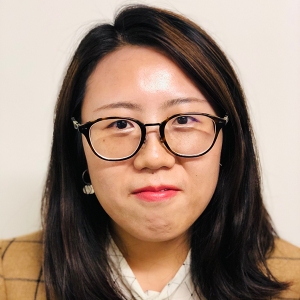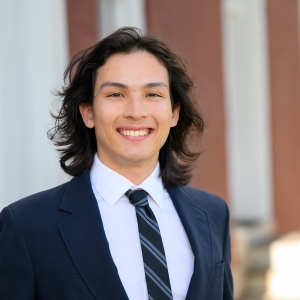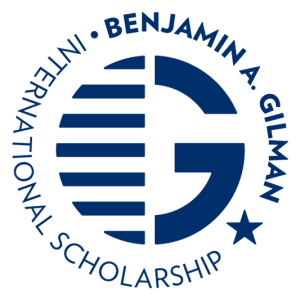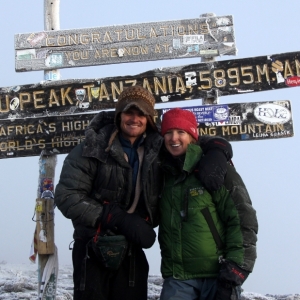
Physics and Engineering Department

The Physics and Engineering Department offers a wide variety of courses, serving students who seek the bachelor of science degree in physics, engineering, or integrated engineering, along with many other STEM disciplines.
Students build upon their studies of physics and engineering to develop careers in a diverse range of professions as well as to support their graduate work in physics, engineering, and related fields.

Son Nguyen to Present Nobel Prize Symposium Talk
The visiting assistant professor of physics will discuss this year’s Nobel Prize in physics on Thursday, Nov. 7.

Tingting Li to Deliver Lecture as Part of the Class of 1963 Scholars in Residence Program
Li’s talk “Insights into Low-Carbon Solution in the Current Automotive Industry” will be held Oct. 25 in Science Addition 114.

After making connections through the W&L alumni network, Caples will be working as a mechanical and design engineer at Hardwire LLC.

W&L’s Thomas Leggett ’25 Selected for Fulbright to Taiwan
Leggett received a Fulbright English Teaching Assistantship to teach English in Taiwan and plans to pursue a career in civil engineering.

Leandro Laperne ’28 Participates in the American Enterprise Institute Summer Honors Program
The rising sophomore completed a week-long program held in Washington, D.C.

Tolu Olubunmi ’02 has made her journey to citizenship an opportunity to inspire and serve others.

Eight W&L Students Awarded Gilman Scholarships to Study Abroad
This round of recipients marks a record-setting Gilman Scholar cohort for W&L.

Brandon Chalk ’00 followed his love for the outdoors all around the world, summiting the highest peaks on each of the seven continents with his wife, Kristine Chalk.

Four sets of twins on W&L varsity sports teams share what it’s like competing side-by-side with their siblings.

Ceramicist and Physicist Hideo Mabuchi to Deliver Lecture on Ceramics and Cultural Belonging
The Stanford University professor’s talk will be held on March 6 at 5:30 p.m. on W&L’s campus.

Twelve W&L Students Awarded Gilman Scholarships to Study Abroad
The Gilman Scholarship Program offers awards of up to $5,000 to U.S. undergraduate students who are Pell Grant recipients.

Dan Mazilu to Present Nobel Prize Symposium Talk
The professor of physics will discuss this year’s Nobel Peace Prize winner on Friday, Nov. 15.

Son Nguyen to Present Nobel Prize Symposium Talk
The visiting assistant professor of physics will discuss this year’s Nobel Prize in physics on Thursday, Nov. 7.

Tingting Li to Deliver Lecture as Part of the Class of 1963 Scholars in Residence Program
Li’s talk “Insights into Low-Carbon Solution in the Current Automotive Industry” will be held Oct. 25 in Science Addition 114.

After making connections through the W&L alumni network, Caples will be working as a mechanical and design engineer at Hardwire LLC.

W&L’s Thomas Leggett ’25 Selected for Fulbright to Taiwan
Leggett received a Fulbright English Teaching Assistantship to teach English in Taiwan and plans to pursue a career in civil engineering.

Leandro Laperne ’28 Participates in the American Enterprise Institute Summer Honors Program
The rising sophomore completed a week-long program held in Washington, D.C.

Tolu Olubunmi ’02 has made her journey to citizenship an opportunity to inspire and serve others.

Eight W&L Students Awarded Gilman Scholarships to Study Abroad
This round of recipients marks a record-setting Gilman Scholar cohort for W&L.

Brandon Chalk ’00 followed his love for the outdoors all around the world, summiting the highest peaks on each of the seven continents with his wife, Kristine Chalk.

Four sets of twins on W&L varsity sports teams share what it’s like competing side-by-side with their siblings.

Ceramicist and Physicist Hideo Mabuchi to Deliver Lecture on Ceramics and Cultural Belonging
The Stanford University professor’s talk will be held on March 6 at 5:30 p.m. on W&L’s campus.

Twelve W&L Students Awarded Gilman Scholarships to Study Abroad
The Gilman Scholarship Program offers awards of up to $5,000 to U.S. undergraduate students who are Pell Grant recipients.

Dan Mazilu to Present Nobel Prize Symposium Talk
The professor of physics will discuss this year’s Nobel Peace Prize winner on Friday, Nov. 15.

Son Nguyen to Present Nobel Prize Symposium Talk
The visiting assistant professor of physics will discuss this year’s Nobel Prize in physics on Thursday, Nov. 7.

Tingting Li to Deliver Lecture as Part of the Class of 1963 Scholars in Residence Program
Li’s talk “Insights into Low-Carbon Solution in the Current Automotive Industry” will be held Oct. 25 in Science Addition 114.
Department Info
-
Physics and Engineering Department
Washington and Lee University
204 W. Washington Street
Lexington, Virginia 24450
Physical Address: Howe Hall / Science Center